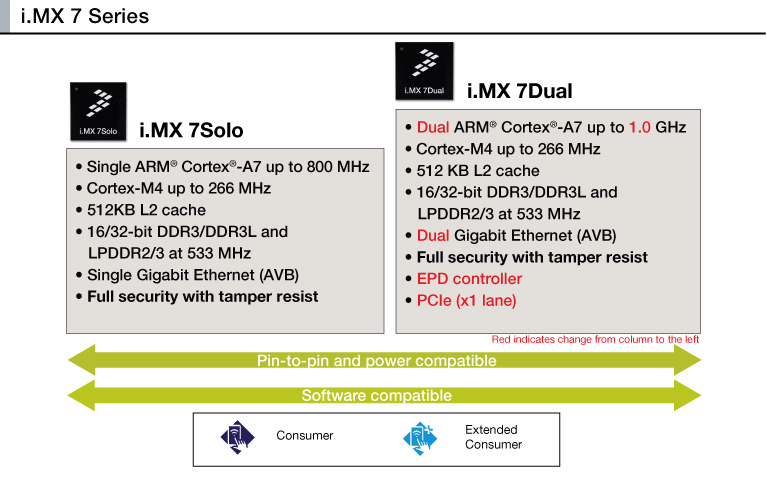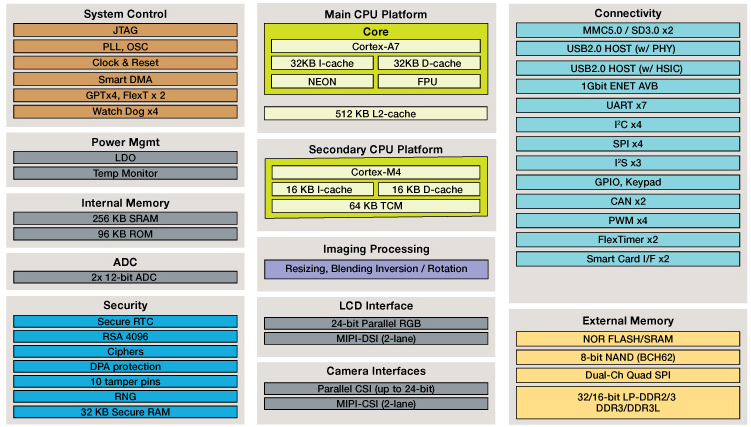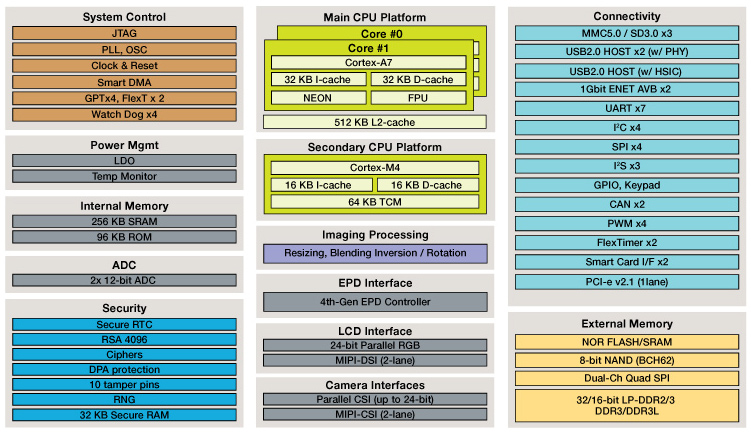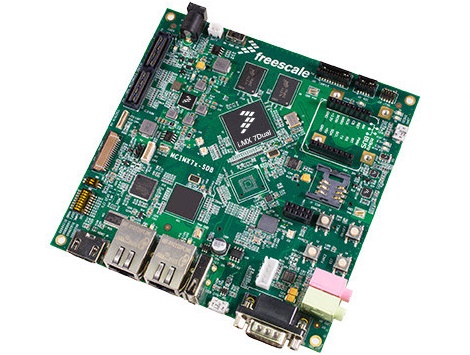Freescale's i.MX 7 SoC Family Focuses On Energy Efficiency And Security For IoT Devices
Freescale unveiled the new i.MX 7 family of SoCs that come with one or two Cortex-A7 CPUs and Cortex-M4 MCUs, and only one third of the power consumption of the older i.MX 6 family. The new chips will be built on a 28 nm process, as opposed to the i.MX 6 chips that were built on 40 nm.
With the new i.MX 7 family, Freescale seems to be getting out of other more performance-focused markets and is headed into low-power devices markets such as the Internet of Things. The i.MX 7 comes with a Linux OS out of the box and support for Android, and it targets IoT, wearables, home automation and industrial products.
Most of the power efficiency improvements come from using a 28 nm process that's focused on making low-power chips and using Cortex-A7 CPUs at a lower "up to 1 GHz" frequency, as opposed to the earlier 1.2 GHz Cortex A9 CPUs. Freescale claimed a CPU core efficiency of 15.7 DMIPS/mW. The Cortex-M4 MCU is also a highly efficient microcontroller that comes with an "up to 266 MHz" clock speed.
The two chips from the i.MX family, the i.MX 7Solo and i.MX 7Dual, also have a Low Power State Retention that only runs at 250 μW (1/4 of a mW) when the chips are idling, according to the company.
All the cores on the SoCs can also be fully powered, including the Cortex-A7 cores and the Cortex-M4 MCUs. This is enabled by the chip's heterogeneous processing technology. When high performance is needed to run the Linux OS, the GUI, the wireless stack or high-bandwidth data transfers, then all the cores can be activated. When high performance is not needed, then only the Cortex-M4 MCUs remain activated.
Freescale's new chips also come with a suite of security features including support for elliptic curve cryptography, active tamper detection, a random number generator, secure boot, isolated security domains and other hardware-enabled security features.
Freescale, like Imagination and others, seems to also put a strong focus on security, especially when it comes to IoT chips, as IoT devices present the danger of remaining unpatched for years if OEMs forget about them once they are sold to customers. Therefore, IoT devices should at least have strong security from the moment they leave the stores, although without updates that still leaves the danger of being exploited down the road. Strong hardware-enabled security should at least significantly limit that potential.
Get Tom's Hardware's best news and in-depth reviews, straight to your inbox.
The i.MX 7Solo and the i.MX 7Dual chips are sampling now, and mass production is scheduled for November 2015. A SABRE developer board will also be available for developers who want to test the new chips. It will integrate a PF3000 PMIC, Wi-Fi 802.11 ac/a/b/g/n and Bluetooth 4.1, as well as an SD card that comes preinstalled with a Linux-based OS. Android will also be available.
Freescale should also announce a new i.MX 8 family soon, although that one may be targeted mainly at the automotive market and likely won't be available on the market until 2016 or 2017.
Follow us @tomshardware, on Facebook and on Google+.
Lucian Armasu is a Contributing Writer for Tom's Hardware US. He covers software news and the issues surrounding privacy and security.
-
ZolaIII The second one (I.MX 7Dual) looks good enough for cheap smart watches.Reply
Anyway the design represents how it should be done.



